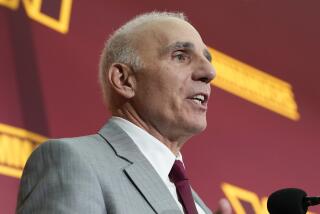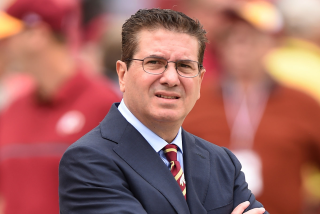Redskinsâ owner helps Native Americans yet clings to racist team name
So Dan Snyder, owner of the Washington Redskins professional football team, visited 26 Native American reservations over four months and discovered a reality that just about everyone else in the country already knew. Native Americans on reservations are disproportionately mired in poverty; affected by alcoholism, diabetes and elevated suicide rates, among other health issues; and lack many of the basic necessities of modern life, including reliable access to potable water.
So Snyder has formed the Washington Redskins Original American Foundation, handed out coats and sneakers on some reservations, announced â40 additional projects currently in progress,â and says âthat our team nameâ â a racial epithet â âcaptures the best of who we are and who we can be.â You have to wonder when the souvenir âOriginal Americanâ hoodies go on sale at the teamâs gift shop.
If Snyder is genuinely taken with the plight of many Native Americans, good for him. And if native people want to take his gifts, good for them.
But Snyder still needs to change the name. All the money and foundation work in the world wonât alter the racism behind the word âredskin.â Yes, thereâs a tradition involved: The team has carried that name since its early Depression-era days in Boston. But thereâs a tradition behind the word, too, as a pejorative description of a race of people.
Years ago, Coleman A. Young, the first African American mayor of Detroit, said something to the effect that the victims of racism, not the perpetrators, are in the best position to recognize it. While Native Americans arenât unified in their rejection of the use of the name, enough are to signal that itâs long past time for the team to make a change. Unless, of course, stubbornly embracing a racial epithet is, indeed, the âthe best of who we are and who we can be.â
ALSO:
The coat hanger, symbol of dangerous, pre-Roe abortions, is back
Why the feminist commentariat was wrong about the LâWren Scott headlines
Hobby Lobby case: Defenders of religious freedom should be careful what they pray for
Follow Scott Martelle on Twitter @smartelle
More to Read
A cure for the common opinion
Get thought-provoking perspectives with our weekly newsletter.
You may occasionally receive promotional content from the Los Angeles Times.











